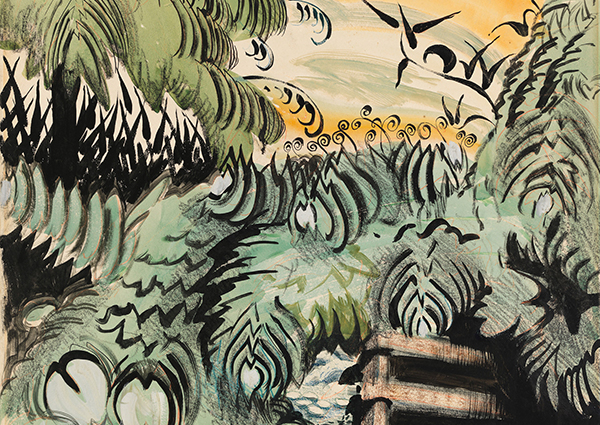Listen:
We leave the frozen
north for the half-frozen
southwest, leave
the driveway, climb
the hill, a December
sun falling behind
the mountain or what passes
for one in this adobe
state, the ghost
white of frigid chamisa
falling everywhere and my eyes
so open
they begin listening
at the periphery, the particulate
air, where they snag
on a pitiful scrub
pine, pulling
its tough green into orbit
around my iris, a color the Romans
called livid. Atticus is strapped
to my chest, his open palm
grazing the desiccated
blossoms, curling closed
around a tuft of piñon
like a starfish
eating a sea urchin. If only
he was as gentle
with the faces of the ones
he loves, who love
him, bloodying
Granddaddy’s
lip with the violent joy
of reunion. We repeat this
word over and over,
gentle, but he is a brute
and handles the world
as if nothing
in it could break. Maybe
he’s right. Or maybe breaking
open is just what
we do
before whatever
is us is
recapitulated, remedied
a bluebird
whirling low
between pines. It’s too fast
for Atticus to track, but we all hear
its call, said to resemble
the word few, or maybe phew!
I catch the gray
bobbing belly
in my livid eye. Few
few, calling
scarcity out, open, the way
its threat belies
an undeniable abundance. We
suddenly see how red-threaded
this world is, tangled, and rereading
the desert’s throb
under all that snow, Atticus
is batting at his own
worn red nose, dutiful
thermometer. We reach
the museums on the hill
where common
desire grows
uncommon, flays
compliance to swell
and throb
where the unmanaged
blaze. We take off
our hats and gloves, blessing
the weather that leaves us
bothered, gentle
thanks even the baby
understands. The bracing that gives
way to embrace. The needles
of the pine there
to be touched, and so too
the cold pane, which he gives
a raspberry. I think
I’m beginning
to understand how brute
and livid love doffs
grace only to regain it
bringing new worlds
into orbit, affront
to everything steady.
When we get home he races
around the house, hands
clutching my fingers so tight
the knuckles swell. Then he’s calm
and searches the floor for
specks, treasure. We give him
a ribbon, a spoon. Everything is art
to be broken. The cat
and the bowl. Finally he sleeps
in the room with the skylight
blocked by tinfoil, tiny
holes for stars, muted clamor
ripping the night open.
